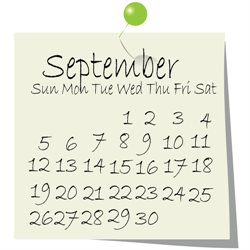Using the Future Tense
in English
Many languages have one form to speak about the future, but there are four ways of using the future tense in English!
Click Here for Step-by-Step Rules, Stories and Exercises to Practice All English Tenses
These can often cause some confusion, so here are brief and basic explanations of the most common uses for each one.
Which form of the future tense should you use?
1. Simple future with (be going to)
For example:
is + going to + swim --> "She is going to swim later."
This is usually the first future form students learn.
A) It is used when talking about future plans.
For example:
- "I am going to visit my grandparents next week."
- "I'm not going to eat at that restaurant again. It was terrible!"
For example:
- "Look at those black clouds. I think it is going to rain."

2. Simple future with (will)
For example:
will + swim / 'll + swim --> "She will swim tomorrow, too."
OR
"She'll swim tomorrow, too."
A) This is usually used when you are making predictions about the future. But only if it is a general prediction, and not supported by evidence.
For example:
- "You will meet a tall, dark, handsome stranger."
- "In the future, children won't go to school."
- "I think cars will fly in the future."

B) It is also used when a decision is made at the time of speaking.
For example:
- "Oh no, it's raining! I think I'll take a taxi."
- "Oh, the phone is ringing. I'll get it!"

3. Present progressive
A) You can use the present progressive to talk about future arrangements.When a plan becomes an arrangement it is in the appointment book, tickets are booked or other arrangements are made then we often use the present progressive.
For example:
- "I'm playing soccer tonight. Do you want to come and watch?"
- "My friends are getting married next week. I'm really excited!"

4. Simple present
Sometimes, the simple present is used to talk about the future if we are talking about something that is happening at a fixed time. For example, a travel timetable, class schedule, or movie times.For example:
- "I have to go to bed early tonight. My plane leaves at 5am tomorrow."
- "I think the movie starts at 8:30."

Common mistakes
Besides using the wrong future form, students often make mistakes when making sentences using one of these forms.The most common mistakes are:
- Forgetting 'am/is/are' when using the 'going to' form.
Incorrect: "I going to visit them tomorrow."
Correct: "I am going to visit them tomorrow."
- Forgetting 'to' when using the 'going to' form.
Incorrect: "She is going take that test again."
Correct: "She is going to take the test again."
- Using the '-ing' form of the verb instead of the base form
with 'going to' or 'will.'
Incorrect: "He will winning the match."
Incorrect: "He is going to winning the match."
Correct: "He will win the match."
- Adding 'to' when using 'will.'
Incorrect: "They will to be sorry."
Correct: "They will be sorry."
Test yourself
If you can understand why the following sentences are incorrect, then you now understand more about future forms in English.- I going to see my parents tomorrow.
- I will go to the concert tomorrow. I booked my ticket this
morning.
- He is going to shopping after school.
- They are to playing tennis this evening.
- The train will leave at 6 o'clock tomorrow.
- I won't to buy that cell phone. It's too expensive."
Read also:
Making
Predictions about the Future in English
Intentions
and Arrangements in the Future
Instant
Decisions and Promises in the Future
Schedules
and Time Tables in the Future
Worksheet:
Predictions Worksheet and Answer Key
Download:
Talking
about the Future in English Series
Step-by-Step Lesson:
Future
in the Past: A Step-by-Step Guide (Rules, Examples, Stories,
Practice)
Click here to download the worksheet: Future Tense Story 1.
Get Updates, Special Offers, and English Resources
Download your FREE GIFT (the first two chapters of
English Short Stories Book and Workbook)
as soon as you join!

By submitting your email, you consent to receiving updates and newsletters from us and to the sharing of your personal data with third parties for the purposes of sending you communications. We will not spam you. You can unsubscribe at any time. For more information, please see our privacy policy.






